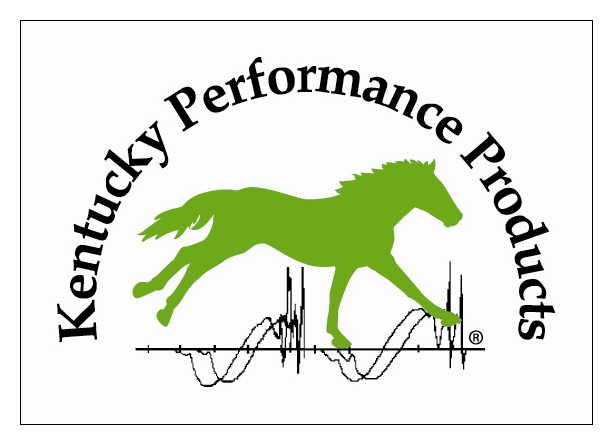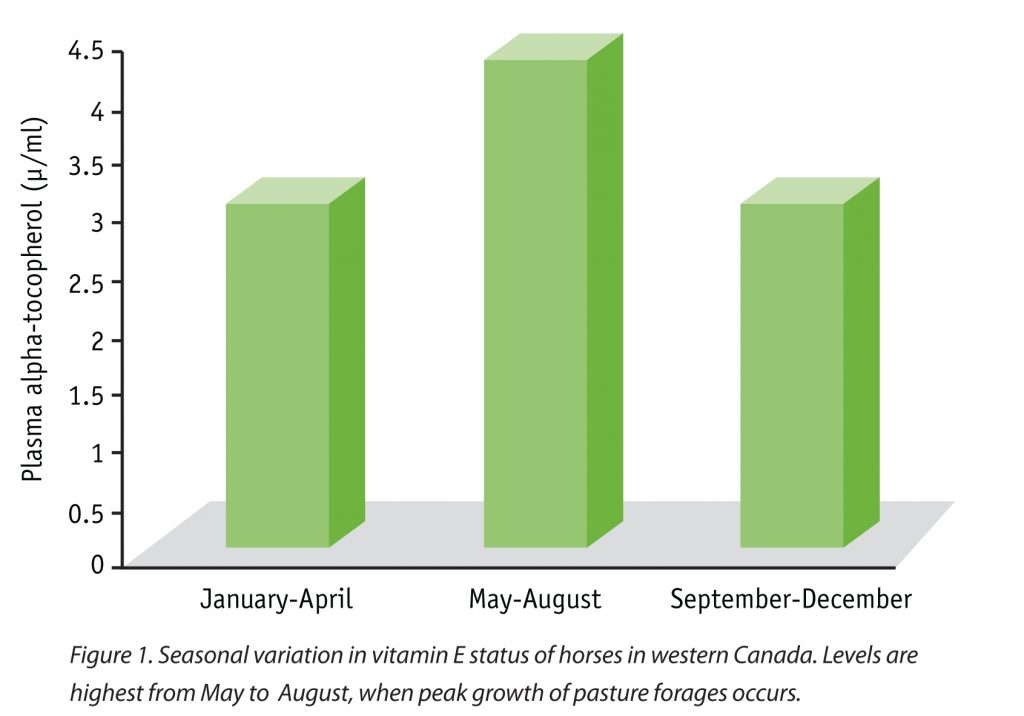
Kentucky Performance Products Nutritional Minute: Vitamin E
Kentucky Performance Products gives us the skinny on one of the most important nutritional building blocks in your horse’s diet: Vitamin E.
F A S T F A C T S
Vitamin E is an essential nutrient for horses
Vitamin E cannot be synthesized by the horse; therefore, it is considered an essential nutrient. The best source of vitamin E is fresh green grass; however, the potency of vitamin E declines very quickly once forages are harvested and dried.
Vitamin E requirements vary from situation to situation. Multiple research studies have shown that vitamin E is often deficient in the diets of horses that do not have access to continual grazing on fresh green grass, or those grazing on winter pasture.
Performance horses with demanding workloads, growing horses and seniors can be exposed to increased levels of oxidative stress and therefore require higher levels of vitamin E in their diets. Studies reveal that horses challenged by neurological disease benefit from supportive natural vitamin E.
T I P S A N D T O P I C S
Researchers Confirm Vitamin E Lower in Horses Without Access to Pasture
Horses are managed in varying conditions throughout the world. A vast number of them do not have access to growing pasture year-round due to geographic region, season, training schedules, or specific management routines. Because of their limited intake of fresh forages, these horses do not consume sufficient vitamin E for optimal health. Insufficient vitamin E in the diet can lead to muscle problems and impaired immune function.
Canadian researchers have confirmed a long-held suspicion among equine nutritionists that horses may need additional vitamin E when not consuming fresh, high-quality pasture grasses (Blakley et al., 1994).
Proper supplementation with a natural vitamin E product such as Elevate® ensures that horses are properly nourished when they cannot spend considerable time grazing fresh pasture.
Key Points of the Study
Procedure: Over a two-year period, researchers at the University of Saskatchewan studied about 400 healthy horses to determine normal levels of vitamin E. Using horses from 24 locations in Alberta and Saskatchewan, researchers collected blood samples and recorded important information about each horse including diet, sex, and age.
Results: Blood samples showed that levels of vitamin E were highest from May to August when compared to other times of the year, as shown in Figure 1: Seasonal variation in vitamin E status of horses in western Canada. Levels are highest from May to August, when peak growth of pasture forages occurs.
Interpretation: The increase in vitamin E levels corresponded to the months in which horses in western Canada consumed feeds containing high levels of naturally-occurring vitamins, namely pasture. Horses consuming only fresh pasture during the summer months had plasma vitamin E concentrations that were 63% greater than horses fed harvested, dried, or pelleted feeds during the same time period.
Recommendations
This confirmed the widely held opinion that green grass is the greatest source of vitamin E. In winter months or throughout periods of stall confinement such as during training, showing, or lay-up, fresh pasture is often not an option. In such cases, horses should be supplemented with a natural vitamin E supplement such as Elevate.
Proper nutritional management of young horses is especially important. The researchers pointed out, “During periods of rapid growth the nutritional demand for vitamins is high, so it is not surprising that young, rapidly growing horses have a lower vitamin status than older horses.” When these young animals are receiving all of their nutrition from processed feeds, their nutritional well-being may be compromised, which may ultimately lead to health problems.
In looking for a vitamin E supplement, be choosy. Select one that contains natural vitamin E (d-alpha-tocopherol). Natural vitamin E is superior to synthetic vitamin E because of its ability to be absorbed quickly from the gastrointestinal tract, hitting target organs faster.
References
Blakley, B.R., & Bell, R.J. 1994. The vitamin A and vitamin E status of horses raised in Alberta and Saskatchewan. Can. Vet. J. 35:297-300.
Pagan, J.D., Kane, E., & Nash, D. 2005. Form and source of tocopherol affects vitamin E status in Thoroughbred horses. Pferdheilkunde 21:101-102.
I N T H E S P O T L I G H T
Natural Vitamin E During the Winter Months
Click here for a larger image.
Article written by KPP staff.
Copyright (C) 2012 Kentucky Performance Products, LLC. All rights reserved.
Article sponsored by Elevate Maintenance Powder; an affordable, easy way to provide essential natural vitamin E, when longer-term vitamin E supplementation is needed.
When health issues arise, always seek the advice of a licensed veterinarian who can help you choose the correct course of action for your horse. Supplements are intended to maintain healthy systems and support recovery and healing. They are not intended to treat or cure illness or injury.
About Kentucky Performance Products, LLC: Since 1998, Kentucky Performance Products has simplified a horse owner’s search for research-proven nutritional horse supplements that meet the challenges facing modern horses. KPP horse supplements target specific nutritional needs and are formulated to complement today’s feeds, thus safeguarding against over-supplementation. Each product is scientifically formulated and made with high-quality ingredients at certified manufacturing facilities. Kentucky Performance Products is proud to offer a quality assurance promise backed by a money-back guarantee. Kentucky Performance Products brings you horse supplements you can count on because the horse that matters to you, matters to us.












Leave a Comment